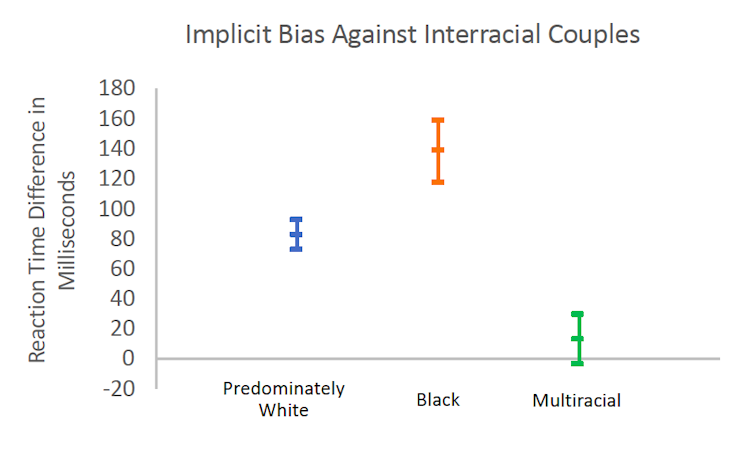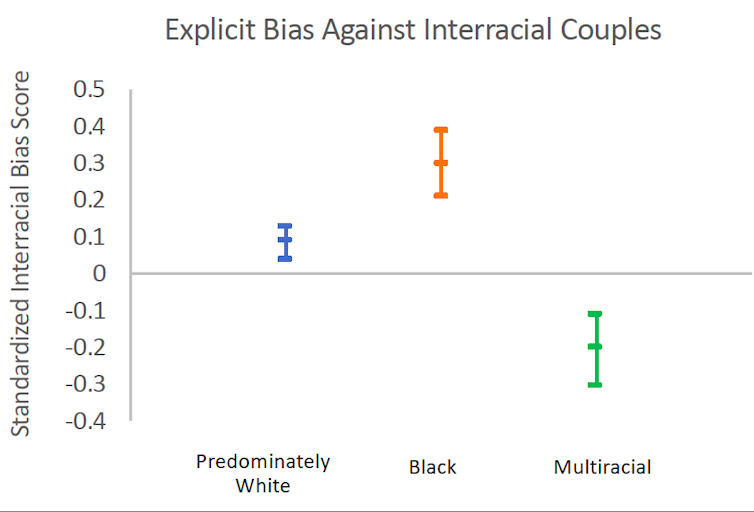In response to the latest U.S. census, roughly 15 % of all newlywed {couples} are interracial. Extra interracial relationships are additionally showing within the media – on tv, in movie and in promoting.
These traits recommend that nice strides have been made within the roughly 50 years because the Supreme Courtroom struck down anti-miscegenation legal guidelines.
However as a psychologist who research racial attitudes, I suspected that attitudes towards interracial {couples} is probably not as optimistic as they appear. My earlier work had supplied some proof of bias in opposition to interracial {couples}. However I wished to understand how widespread that bias actually is.
What does every race suppose?
To reply this query, my collaborator James Rae and I recruited contributors from all through the U.S. to study implicit and express attitudes towards black-white interracial {couples}.
Psychologists usually differentiate between express biases – that are managed and deliberate – and implicit biases, that are robotically activated and are usually troublesome to manage.
So somebody who plainly states that individuals of various races shouldn’t be collectively can be demonstrating proof of express bias. However somebody who reflexively thinks that interracial {couples} can be much less accountable tenants or extra more likely to default on a mortgage can be displaying proof of implicit bias.
On this case, we assessed express biases by merely asking contributors how they felt about same-race and interracial {couples}.
We assessed implicit biases utilizing one thing known as the implicit affiliation check, which requires contributors to shortly categorize same-race and interracial {couples} with optimistic phrases, like “happiness” and “love,” and detrimental phrases, like “ache” and “warfare.” If it takes contributors longer to categorize interracial {couples} with optimistic phrases, it’s proof that they doubtless possess implicit biases in opposition to interracial {couples}.
In complete, we recruited roughly 1,200 white folks, over 250 black folks and over 250 multiracial folks to report their attitudes. We discovered that general, white and black contributors from throughout the U.S. confirmed statistically important biases in opposition to interracial {couples} on each the implicit measure and the specific measure.
In distinction, contributors who recognized as multiracial confirmed no proof of bias in opposition to interracial {couples} on both measure.
The determine under exhibits the outcomes from the implicit affiliation check. The strains point out the typical discrepancy within the size of time it took contributors to affiliate interracial {couples} with optimistic phrases, when in comparison with associating same-race {couples} with optimistic phrases. Discover that for multiracial contributors, this common discrepancy overlaps with zero, which signifies an absence of bias.

Allison Skinner and James Rae, Writer supplied
Subsequent is a determine detailing the outcomes from the specific bias check, with strains measuring common ranges of express bias in opposition to interracial {couples}. Constructive values point out bias in opposition to interracial {couples}, whereas detrimental values point out bias in favor of interracial {couples}. Be aware that multiracial contributors really present a bias in favor of interracial {couples}.

Allison Skinner and James Rae, Writer supplied
Though we can not know for positive from our information, we consider that the shortage of bias noticed amongst multiracial contributors could stem from the truth that they’re the product of an interracial relationship. Then there’s the fact of their very own romantic relationships. Multiracial folks have few romantic choices that might not represent an interracial relationship: Over 87 % of multiracial contributors in our pattern reported having dated interracially.
Predicting bias
We additionally wished to know what would possibly predict bias in opposition to interracial {couples}.
We anticipated that those that had beforehand been in an interracial romantic relationship – or had been presently concerned in a single – would maintain extra optimistic attitudes.
For each white and black contributors, that is exactly what we discovered. There was one catch: Black contributors who had beforehand been in an interracial relationship had been simply as more likely to harbor express biases as those that hadn’t been in a single.
Subsequent, we wished to check whether or not having shut contact – in different phrases, spending high quality time with interracial {couples} – was related to optimistic attitudes towards interracial {couples}. Psychological proof has proven that contact with members of different teams tends to scale back intergroup biases.
To get at this, we requested contributors questions on what number of interracial {couples} they knew and the way a lot time they spent with them. We discovered that throughout all three racial teams, extra interpersonal contact with interracial {couples} meant extra optimistic implicit and express attitudes towards interracial {couples}.
Lastly, we examined whether or not simply being uncovered to interracial {couples} – corresponding to seeing them round in your group – can be related to extra optimistic attitudes towards interracial {couples}. Some have argued that publicity to interracial and different “combined standing” {couples} can function a catalyst to scale back biases.
Our outcomes, nonetheless, confirmed no proof of this.
Basically, contributors who reported extra publicity to interracial {couples} of their local people reported no much less bias than those that reported little or no publicity to interracial {couples}. In actual fact, amongst multiracial contributors, those that reported extra publicity to interracial {couples} of their local people really reported extra express bias in opposition to interracial {couples} than these with much less publicity.
The outlook for the long run
In response to polling information, solely a small share of individuals within the U.S. – 9 % – say that the rise in interracial marriage is a foul factor.
But our findings point out that almost all within the U.S. harbor each implicit and express biases in opposition to interracial {couples}. These biases had been fairly strong, displaying up amongst those that had had shut private contact with interracial {couples} and even some who had as soon as been concerned in interracial romantic relationships.
The one ones who didn’t present biases in opposition to interracial {couples} had been multiracial folks.
Nonetheless, in 2015, 14 % of all infants born nationwide had been combined race or combined ethnicity – practically triple the speed in 1980. In Hawaii, the speed is 44 %. So regardless of the persistence of bias in opposition to interracial {couples}, the variety of multiracial folks within the U.S. will solely proceed to develop – which bodes properly for interracial {couples}.
Supply By https://theconversation.com/how-do-americans-really-feel-about-interracial-couples-99173